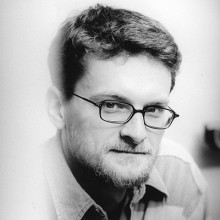Polish literature

Wojciech Kuczok
Born in 1972, he writes fiction and poetry, is a film critic and screenwriter, and a speleologist.
He wrote the screenplay for the feature film Pręgi [Stripes], directed by Magdalena Piekorz. He lives in Cracow and Chorzów. Wojciech Kuczok has gain recognition as a leading young novelist. The critics stress two aspects of his work: his talent for stylisation and for composition. Kuczok styles his narratives to sound like Silesian speech, the dialect of the Tatra highlanders, uneducated people, or youth slang, which is made easier by the fact that the basic structure of most of his stories is the spoken monologue. As well as his stylistic skills, his sense of composition is also evident in his stories. His ideal is the “well made” story, transparently and precisely composed. Kuczok reveals his creative art in the story Devil, which is told in the form of a single sentence, the first in the collection Not Unheard Stories; this is a typical example of Kuczok’s work and has been highly praised by the critics. At the fictional level the story focuses on a father-son relationship and includes scenes in which the father cruelly abuses the child by beating him with a riding crop. Kuczok“s more recent work prompts us to view Devil as a key story for his later writing, especially the novel Muck, which was a bestseller and stirred debate in the media on violence within the family. As Kinga Dunin wrote about it: ‚You could just shrug and say it is Devil all over again, unnecessarily lengthened (…) The crop in Devil is one short word, here it gets more than a whole page to describe it, but it is worth taking a closer look at.”
“Muck is the story of a family hell, told by a child who already has all that behind him, and can now relate to it as history, but for some reasons has not stopped being a child. It’s about those shivers down the spine that make themselves felt in mid-word; about the lack of hurry with which the whole thing develops; about obsessively solemnising fictional minutiae.”
Wojciech Kuczok
BIBLIOGRAPHY
- Opowieści samowite, Bytom: „FA-art” 1996.
- Opowieści słychane, Kraków: biblioteka Studium,Zielona Sowa 1999. (nominacja do Nagrody Literackiej NIKE, nagroda PTWK).
- Szkieleciarki, Kraków: Zielona Sowa 2002.
- Gnój, Warszawa: W.A.B. 2003.(Książka laureatka Nagrody NIKE).
- Widmokrąg, Warszawa: W.A.B. 2004.
- Opowieści przebrane, Warszawa: W.A.B. 2005.
- To piekielne kino, Warszawa: W.A.B. 2006.
- Senność, Warszawa: W.A.B. 2008.
- Moje projekcje, Warszawa: W.A.B. 2009.
- Spiski. Przygody tatrzańskie, W.A.B., Warszawa 2010.
- Poza światłem, W.A.B., Warszawa 2012.
- Obscenariusz, W.A.B., Warszawa 2013.
TRANSLATIONS
Croatian:
- Glib [Gnój], Zagreb: Hrvatsko filolosko drustvo, 2005
Czech:
- Smrad [Gnój], trans. Barbora Gregorová, Praha: Havran, 2009
Dutch:
- Beerput [Gnój], Amsterdam: Van Gennep, 2004
- Schimmering [Widmokrąg], trans. Karol Lesman, Amsterdam: Van Gennep, 2010
French:
- Antibiographie [Gnój], trans. Laurence Dyèvre, Paris: Editions de l'Olivier, 2006
- Horizon fantôme [Widmokrąg], trans. Laurence Dyèvre, Paris: Editions de l'Olivier, 2007
German:
- Im Kreis der Gespenster [Widmokrąg], Frankfurt am Main: Suhrkamp, 2006
- Dreckkerl. Eine Antibiographie [Gnój], trans. Gabriele Leopold, Dorota Stroińska, Frankfurt am Main: Suhrkamp 2007
- Höllisches Kino [To piekielne kino], trans. Gabriele Leupold i Dorota Stroińska, Frankfurt am Main: Suhrkamp, 2008
- Lethargie [Senność], trans. Renate Schmidgall, Berlin: Suhrkamp Verlag 2011
Hungarian:
- Búz [Gnój], trans. Körner Gábor, Budapest: Magvető, 2007
Italian:
- Melma [Gnój], trans. Silvano De Fanti, Udine: Forum, 2009.
Lithuanian:
- Mešlas: antibiografija [Gnój], trans. Kazys Uscila, Vilnius: Mintis, 2005
Romanian:
- Mizeria. Antibiografie [Gnój], trans. Constantin Geambasu, Bucuresti: Editura Polirom, 2008
Russian:
- Дряньё [Gnój], Moskwa: NLO, 2005
- Kak son [Senność], trans. Jurij Czajnikow, Sankt-Petersburg: Azbuka, 2011
Serbian:
- Pogan [Gnój], trans. Milan Duskov, Laguna 2006
Slovak:
- Hnoj [Gnój], Bratislava: Belimex, 2005
Ukrainian:
- Гівнюк [Gnój], trans. Natalia Czorpita, Calvaria 2007